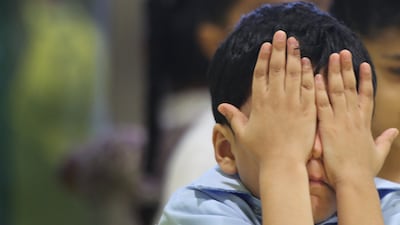Most schools across the UAE reopen for a new academic year today. Pupils, parents and teachers have returned from summer break, preparing for the familiar routine of early starts, home work and school runs. The new session is an exciting but also hectic time in most households with children, as they make last-minute preparations of school uniforms and ensure pupils are equipped with textbooks, stationery, lunch boxes and other essentials of classroom life.
The beginning of school term is an important time in other ways, too. Primary among those is making sure schools continue to provide a safe and welcoming learning environment. This is even more important for new pupils, who need that extra kindness and support in adjusting to teachers and classmates, making friends, and crucially, not being bullied.
Pupils who've been at the receiving end know how traumatising it can be for a school bully to pick on them. In 2019, the National Bullying Prevention Centre in the US said one out of every five pupils had reported being bullied. Even with data somewhat scarce, that number can be comparable to other parts of the world.
In 2019, the Ministry of Education said up to a quarter of all school pupils in the UAE were being bullied. In subsequent years, remedial steps have been taken to put an end to this age-old menace. Some of these include using technology and QR codes to offer pupils the option to anonymously ask for help without fear of repercussions from the bullies.
Whether or not parents and teachers see any symptoms (such as behaviour change, altered eating habits, general anxiousness) of children being bullied – or indeed bullying other children – they must have conversations to educate them about acceptable and compassionate behaviour.
It is the responsibility of parents and teachers to talk to youngsters, sensitise and remind them of the absolute importance of not causing harm and not staying silent if they witness harm being done. Too often, even in adults, we hear about long-term psychological effects of bullying. Some parents will remember from their own school days, the humiliation of being easy targets or witnessing a classmate or friend being picked on and the feelings of helpless anger and fear that can follow, and stay in the mind for a long time.
One way of ensuring better mental health in future generations is to make sure pupils are not scared during any part of their school day. Nowadays, however, bullying is not limited to the classroom, playground or the school bus. In our constant digital lives, with the presence of social media, cyber bullying is too potent and ubiquitous a threat to be ignored, especially after Covid-19 led to long durations of distance learning, and there is a need for those added guard rails to be in place.
UAE authorities have factored this in and for years have been taking proactive steps, devising effective methods to stop at the source the serious harm that such behaviour can cause. One such example is an award for those who stand against bullying. The Supreme Council for Motherhood and Childhood’s Bullying Prevention in Schools Award is a step in that positive direction. The SCMC’s anti-bullying programme has a vast scope – it runs in 64 schools in collaboration with the Ministry of Education, Department of Education and Knowledge Abu Dhabi and Unicef.
Other emirates, too, have developed action plans. Dubai's Knowledge and Human Development Authority encourages all schools to have "a child protection policy". The broad guidance is to raise any incidents or concerns immediately with the school and to contact the authority if the bullying doesn't stop.
As pupils this week re-familiarise themselves with time tables and the rigours of school, it is important that the education community renews its focus to build a culture that doesn't tolerate bullying and works towards the well-being of all pupils so that they grow into and enter the workforce as secure, well-rounded adults.


